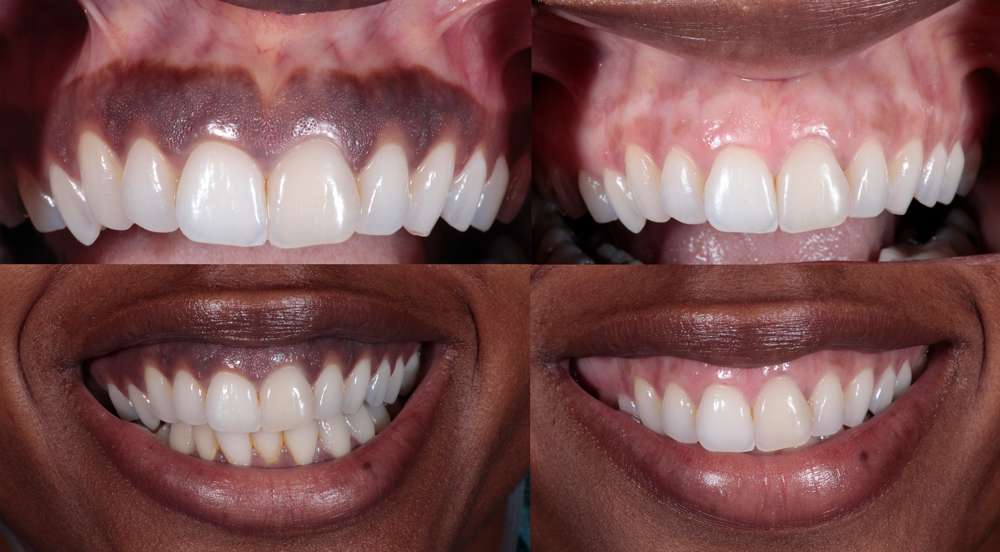Table of Contents
Shades of Black: Understanding the Different Causes of Dark Gums
Intro
Are your gums looking darker than usual? If so, you may be wondering what is causing the change in color. Dark gums, or black gums, can have a variety of causes ranging from an unavoidable variance in gum color to the result of smoking, drug interactions, Addison’s illness, or even cancer. In this blog post, we’ll explore the different causes of dark gums and how to identify them.
What are black gums?
Black gums refer to a condition in which the color of the gums becomes dark or blackened. While most people have pink gums, variations in gum color are not uncommon. Dark gums may occur naturally in some individuals, especially among those with higher levels of melanin, which gives color to our skin, hair, and gums.
In other cases, the darkening of gums can be indicative of an underlying issue. It is essential to differentiate between normal variations in gum color and those caused by certain conditions or habits. Factors such as non-cancerous lesions, smoking, amalgam tattoos, drug interactions, Addison’s disease, or even cancer can contribute to darkened gums.
If you notice your gums becoming dark or black, it is crucial to consult a dentist to determine the underlying cause. They can evaluate your oral health, examine your gums, and identify any potential issues that may be contributing to the discoloration. By understanding the different causes of dark gums, you can take the necessary steps to address the underlying problem and restore your gum’s natural color and health.

Common causes of black gums
While black gums may be an unavoidable natural variance in gum colour, there are additional causes to consider. One common cause of black gums is the presence of non-cancerous lesions, such as amalgam tattoos. These tattoos can occur when tiny metal particles from dental fillings or crowns become trapped in the gum tissue. They are typically harmless but can cause darkened areas in the gums.
Smoking is also a known cause of Dark Gums. Tobacco use can lead to a buildup of tar and other chemicals that stain the gums and teeth. Similarly, certain medications and drug interactions can lead to gum discolouration.
Addison’s disease, a rare disorder that affects the adrenal glands, can also cause darkening of the gums due to a buildup of melanin in the skin. In rare cases, black gums may even be a sign of oral cancer.
It is important to note that if you have concerns about the appearance of your gums, you should consult with a dental professional. They can help identify any underlying causes and provide appropriate treatment.
Non-cancerous lesions and black gums
Black gums can be caused by non-cancerous lesions that develop in the oral cavity. These lesions, also known as hyperpigmentation or melanin hyperactivity, occur when the melanin cells in the gums become overactive and produce excessive pigment. This can result in the gums appearing darker or even black in color.
One common type of non-cancerous lesion that can cause black gums is called oral melanotic macule. These are small, flat spots that develop on the lips, cheeks, or gums. While they are harmless and don’t typically cause any symptoms, they can be a cosmetic concern for some individuals.
Another cause of non-cancerous lesions leading to Dark Gums is lichen planus, an inflammatory condition that affects the skin and mucous membranes. When lichen planus affects the gums, it can cause pigmentation changes and result in darkened gums.
It’s important to note that while non-cancerous lesions can cause black gums, they are typically harmless and not a cause for concern. However, it’s always best to consult with a dentist or oral health professional to properly diagnose and treat any changes in gum color or appearance.
In the next section, we will explore the relationship between smoking and the darkening of gums.
Smoking and its effect on gum color
Smoking is known to have a detrimental effect on overall oral health, and this includes the appearance of the gums. Regular smoking can lead to black or brown discoloration of the gums, especially near the base of the teeth. This discoloration is caused by the nicotine and tar present in cigarettes, which can cause the blood vessels in the gums to shrink and restrict blood flow. As a result, the gums may appear darker and discolored.
Smokers are also at an increased risk for gum disease, which can further darken the gums. Gum disease, also known as periodontal disease, occurs when the bacteria in plaque builds up and infects the gums, leading to inflammation and potentially tooth loss.
Quitting smoking can not only improve the overall health of the mouth, but it can also improve the appearance of the gums. The discoloration may not completely disappear, but it can significantly improve over time. Additionally, quitting smoking can decrease the risk of gum disease and other oral health problems.

Addison’s disease as a cause of black gums or Dark Gums
Addison’s disease, also known as adrenal insufficiency, is a rare but serious condition that can cause a range of symptoms, including darkening of the skin and gums. In people with Addison’s disease, the adrenal glands do not produce enough cortisol, a hormone that helps regulate various bodily functions. This deficiency can lead to a condition called hyperpigmentation, where the skin and gums become darker in color.
When it comes to Dark Gums, Addison’s disease can cause a condition known as “buccal pigmentation,” which refers to the darkening of the inner lining of the cheeks and gums. This pigmentation is often more pronounced in certain areas, giving the gums a patchy or speckled appearance.
If you suspect that your black gums may be due to Addison’s disease, it is important to seek medical attention for a proper diagnosis. Treatment for Addison’s disease involves hormone replacement therapy to restore cortisol levels in the body. Once hormone levels are regulated, the pigmentation of the gums may improve over time.
In addition to seeking medical treatment, it is crucial to maintain good oral hygiene practices to improve gum health. Regular brushing and flossing, along with routine visits to the dentist, can help prevent gum disease and maintain healthy gums. Consulting with a dental professional can also provide personalized recommendations and guidance to address any concerns related to gum health.
Remember, while Addison’s disease can cause black gums, it is just one of several potential causes. If you are experiencing any changes in your gum color or have concerns about your oral health, consult with a healthcare professional for a comprehensive evaluation and appropriate management.

